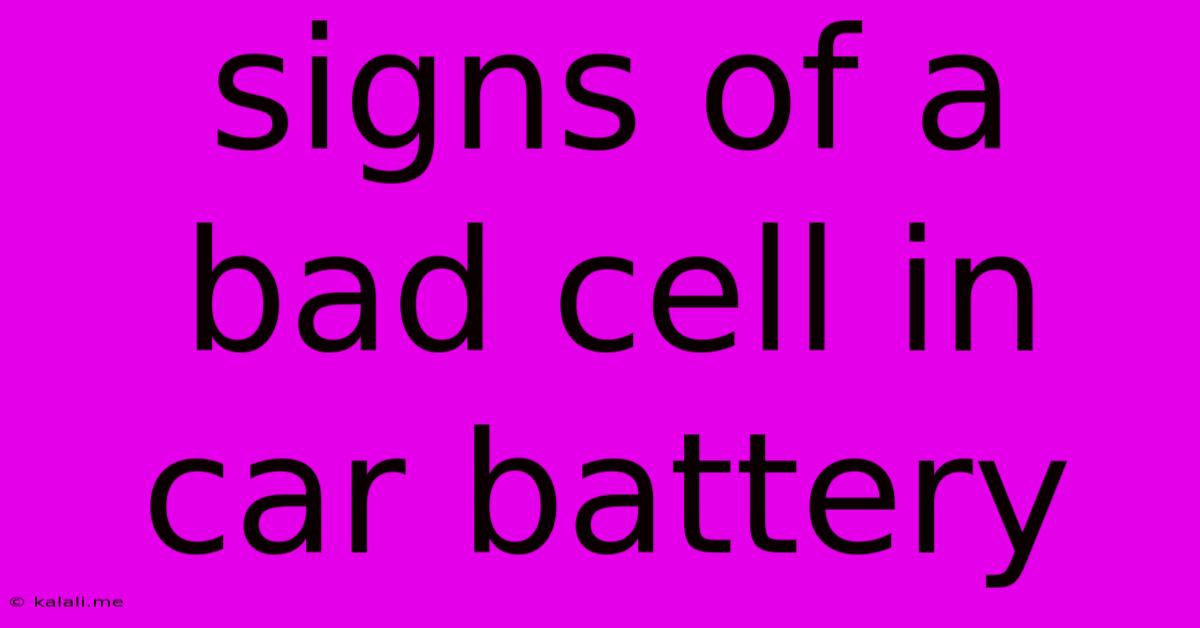Signs Of A Bad Cell In Car Battery
Kalali
May 24, 2025 · 3 min read

Table of Contents
Signs Your Car Battery Cell is Failing: A Comprehensive Guide
Is your car struggling to start? Experiencing dimming headlights or strange electrical issues? These could be signs that a cell in your car battery is failing. A failing battery cell can lead to significant car problems and even leave you stranded. This article will delve into the key indicators that a cell in your car battery is on its way out, helping you diagnose the issue and avoid costly repairs down the line.
Understanding Car Battery Cells
Before we dive into the signs of a failing cell, let's quickly understand the basics. A typical car battery consists of several individual cells connected in series. Each cell generates a voltage, and the total voltage of the battery is the sum of the individual cell voltages. If even one cell fails, the entire battery's performance suffers significantly.
Key Signs of a Bad Cell in Your Car Battery
Several warning signs indicate a problem with one or more cells in your car battery. These signs aren't always immediately obvious, so it's crucial to pay attention to any unusual behavior from your car's electrical system:
-
Slow Engine Cranking: This is a classic symptom. When you turn the key, the engine cranks slowly or struggles to turn over. This indicates the battery isn't providing enough power to the starter motor, a likely result of a failing cell. A completely dead battery will not crank at all, but a slow crank is often the first sign of a problem brewing.
-
Dim Headlights and Interior Lights: If your headlights are dimmer than usual, or your interior lights are noticeably less bright, it suggests a drop in the battery's voltage. This voltage drop is a direct indicator that one or more cells aren't functioning correctly and aren't supplying enough power to the vehicle's electrical system.
-
Clicking Sound When Turning the Key: This sound typically means the battery doesn't have enough power to engage the starter motor. While this can indicate a completely dead battery, it's also a common symptom of a weak cell struggling to provide sufficient amperage.
-
Swollen Battery Case: A visibly swollen battery case, or bulging sides, is a strong indication of a failing cell. This occurs due to the build-up of gases within the battery caused by internal chemical reactions. Never attempt to jump start or use a swollen battery, as it poses a risk of explosion.
-
Corrosion on Battery Terminals: While not directly indicative of a bad cell, excessive corrosion on the battery terminals can restrict the flow of electricity and prevent the battery from performing optimally. This corrosion can exacerbate the issues caused by a weak cell, and therefore should always be addressed.
-
Sulfation: This is a chemical process where lead sulfate crystals build up on the battery plates, reducing the battery's ability to hold a charge. While not visually apparent, sulfation often manifests as the symptoms mentioned above—slow cranking, dim lights, and clicking sounds. Regular battery maintenance can help mitigate sulfation.
-
Battery Load Test Failure: A professional battery load test at an auto parts store or mechanic can confirm a bad cell. This test measures the battery's ability to deliver current under load and will pinpoint whether a cell is weak or completely dead.
What to Do if You Suspect a Bad Battery Cell
If you notice any of these signs, it's crucial to address the issue promptly. Ignoring a failing battery cell can lead to more significant problems, including:
- Stranding: Your car might completely fail to start, leaving you stranded.
- Damaged Electrical Components: A weak battery can damage sensitive electrical components in your vehicle.
- Increased Repair Costs: The longer you wait, the more extensive and costly the repairs might become.
The best course of action is to have your car battery professionally tested. This will determine if a single cell is the problem or if the entire battery needs replacement. Remember, preventative maintenance, like regular battery checks and cleaning of the terminals, can significantly extend the lifespan of your car battery.
Latest Posts
Latest Posts
-
How To Backfeed House With Generator
May 25, 2025
-
E B G D A E
May 25, 2025
-
Do That Voodoo That You Do
May 25, 2025
-
Disconnect Battery While Car Is Running To Check Alternator
May 25, 2025
-
Drill Bits Black Oxide Vs Titanium
May 25, 2025
Related Post
Thank you for visiting our website which covers about Signs Of A Bad Cell In Car Battery . We hope the information provided has been useful to you. Feel free to contact us if you have any questions or need further assistance. See you next time and don't miss to bookmark.